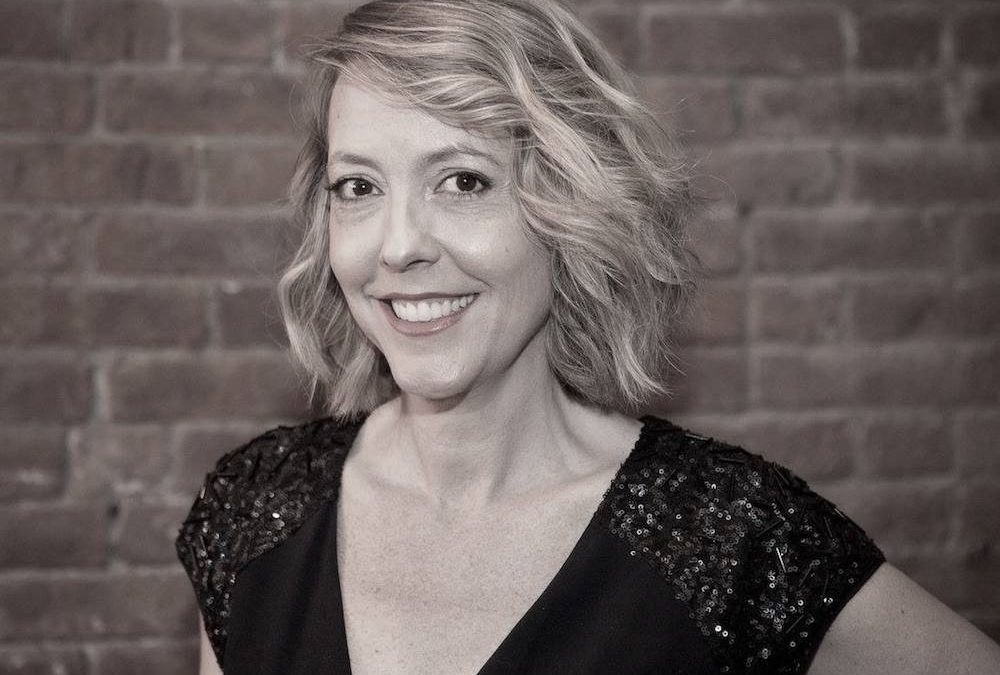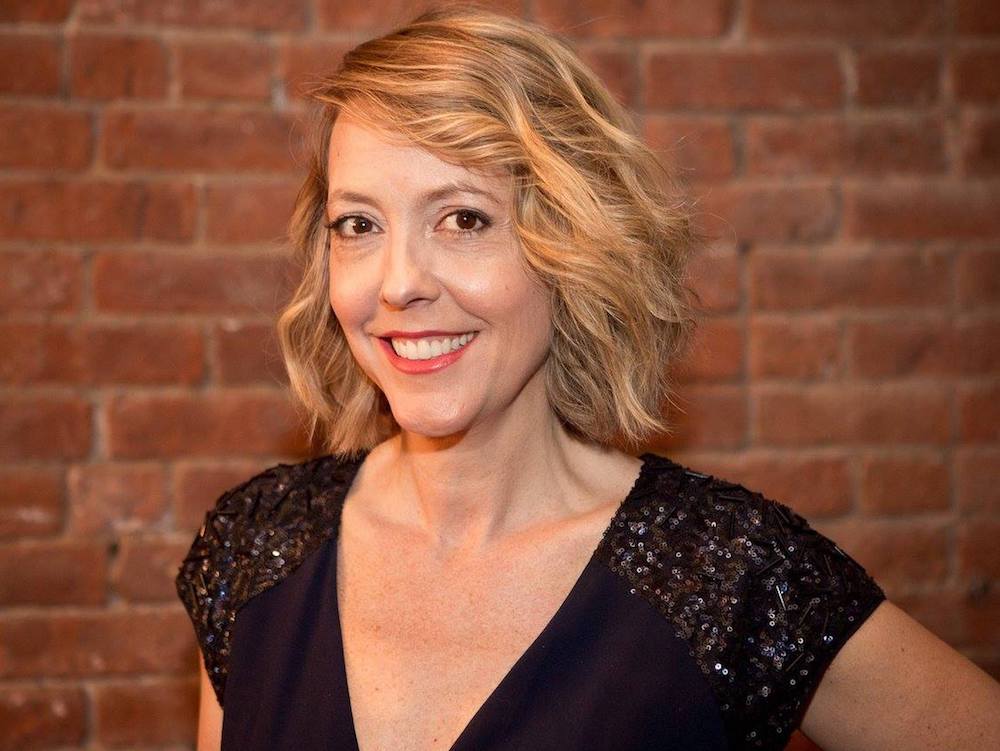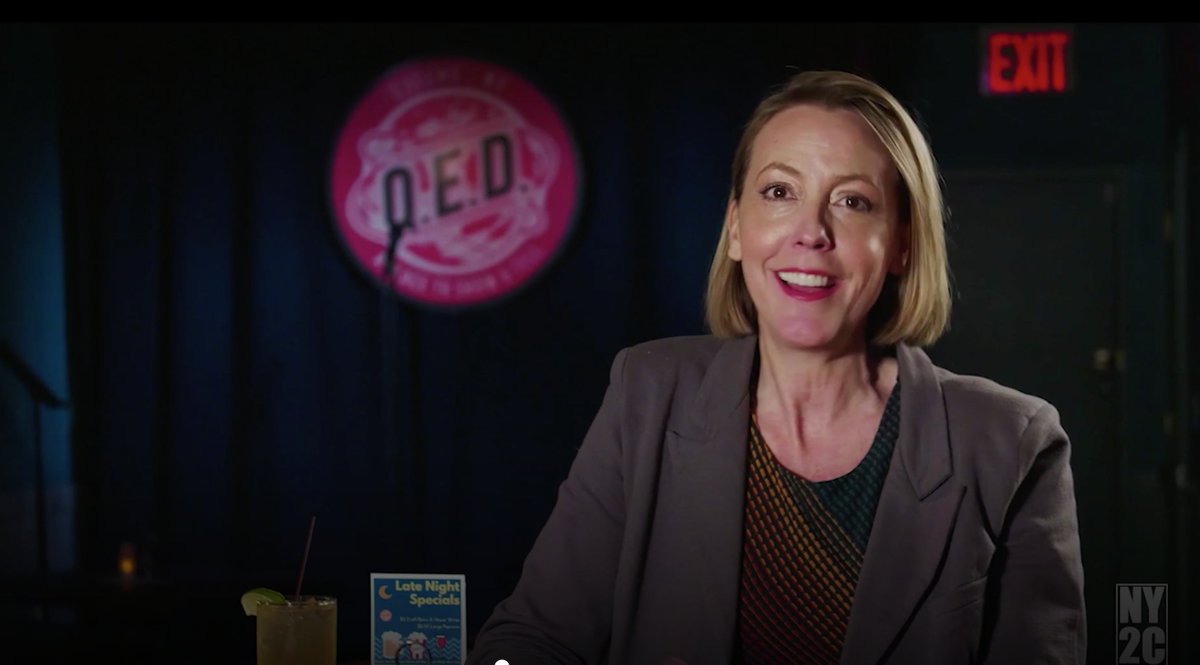Give Thanks! Kambri Crews and Q.E.D. Celebrate Five Years of Bringing Together Comedy’s Biggest and Smallest Names


It’s Thanksgiving and we’re sharing something (and someone) New York comedy is very thankful for. Tucked away in a far corner of New York City lies a small but beloved room called Q.E.D. But don’t let its size or its proximity to Manhattan fool you, Q.E.D. is an important part of New York’s multi-scene comedy universe, and so is its creator, Kambri Crews.
The Astoria comedy and community collective was born in 2014, and started out with the intention of being “different” from comedy clubs, and different even from other alt rooms. Community, small market, inclusivity and creativity were the keys for Kambri Crews who opened Q.E.D. to give a home to her ideas and ideals. And a home for all kinds of comedy.
And now, five years later, Q.E.D is thriving, and providing an important home to comedians big and small. Jim Gaffigan loves Q.E.D., so does Todd Barry, and Leslie Jones, Kate McKinnon, Michelle Wolf, Janeane Garofalo, John Fugelsang, and television’s most powerful writers like SNL head writer Bryan Tucker, Full Frontal writer Mike Drucker, and Eric Drysdale who writes for The Daily Show. Q.E.D. has not only attracted stars, it’s given birth to a new generation of future stars.
Although she built Q.E.D. from the ground up, Crews didn’t stumble into the business by accident. She’s been in the New York comedy scene both as a performer and a programmer for over fifteen years, creating and running Ochi’s Lounge a tiny but mighty comedy club located in the basement of Comix in New York City, as a producer and publicist for Comix, and a comedy booker for 92Y. Prior work in event planning, public relations and marketing have all become a part of the mix that makes Kambri effective. And over the course of her career at Ochi’s, at 92Y and now at Q.E.D., she’s provided scores of writers and comedians their first access to a New York stage and become a powerful first contact for many in the industry.
After Comix shut down, Crews put all her energy into writing a memoir. A book tour followed and when that experience wrapped she found herself wondering…what next? Her husband, comedian Christian Finnegan knew that she missed the experience of running Ochi’s Lounge, and nudged her to follow her instinct to begin curating a creative space. “She’s a woman of just vast talents and capabilities. She’s the most capable person I’ve ever met to the point where it’s annoying, quite frankly. I don’t like it,” he joked. “I’m not taking credit for it by any means, but I had always encouraged her as like, “To me, you curating your own space, you have all these talents and that’s the one kind of thing where you could use all of your talents at once in terms of event planning and also organization and sort of creativity and all these things.” And so we kind of just took the plunge and we started looking at real estate in Astoria because that’s where we live.”
The inspiration for Q.E.D. was a blend of alt comedy spaces and creative collectives with the ultimate idea of creating after school for grownups with an emphasis on comedy. Classes, parties, art, board games, comedy shows, trivia nights- Q.E.D. has them all. “She wanted a space and of course I did as well, that reflected the whole the entirety of her interests and that would feel like a welcoming space for people in the community,” Christian said. And it does. There’s no secret handshake to be welcome here, no level you have to pass to be included.
It’s a small, intimate space, seating a max of 74. And that’s exactly the way Kambri wanted her space to be. She explained, “I’d rather have a smaller space that feels great, then try to just have a cattle coming in and out. You know those that feel, when you go to some of the bigger clubs, where you’re being herded in from room to room. The turnover is so fast, and you feel like you’re shuttled in and out, that you don’t really matter.” But everyone matters at Q.E.D., which is key to keeping comics, and fans, coming back year after year.
“They feel welcome, first of all,” she told me when I asked what the secret is to Q.E.D.’s success with such a wide array of comics. “They are treated with respect, and they feel welcome, and there’s a good energy, and very supportive.” That’s particularly important to comics who don’t necessarily thrive in cutthroat environments present in many bigger clubs. There are great talents who don’t have the aggressiveness to compete in those environments, but that doesn’t mean they are any lesser. It just makes them different. And that’s something Q.E.D. recognizes and embraces.
Support is a buzzword at the club, where there’s a rule even at open mics. And its not just Kambri and her team being supportive- she fosters an environment where comedians have to be supportive of others. One rule asks that nobody can look at their phone in the room- not even other comics. If you want to look at your notes, you have to leave the room. She also asks that comics coming to an open mic stay till the end. To help incentivize people to do that instead of rushing off to other gigs, she offers comics who stick around a chance to win a priority spot, and a dollar off a drink. “So it’s like a little coupon. It’s still a little something to say, “Hey, thanks for sticking around to the end, and sticking it out with us, and here’s a chance to win this priority spot.”

That tribe ethic, Kambri believes, is one of the keys to the kind of networking that can help launch careers. It’s also one of the reasons she was able to get so many great performers to come check out Q.E.D. “My husband in his early days of comedy, and me and my early days at Comix and Ochi’s lounge, I developed relationships with these young people, that were my age, and at the same level as me. We all built each other up. Now a lot of them have gone on to win multiple Emmy’s and be nominated for major awards, Oscars and Emmys, and whatnot. Then Christian, his little tribe that he developed, they have this deep friendship now that spans over 20 years.A lot of them have gone on to write for Conan and Saturday Night Live. And so when I open a space at the end of the line, in middle of nowhere Astoria, who do we look, to say, “Hey, we’re doing this thing.’ We look to those people that we’re friends with, and they just happened to be the head writer of Saturday Night Live. They just happen to help create the Colbert Report.”
Brian Tucker is one of those people. As the head writer for Saturday Night Live, his primary job is writing, but he still likes performing. “I think what performing does that writing and television doesn’t have is you can get up there and try and be funny exactly on your own terms, you know? You write it, you do it exactly the way you want it to be done, and so you can test it out exactly the way you had envisioned it. Whereas writing for a thing like SNL, it’s filtered through the cast or the host, through the audience at home in some ways, and through Lorne Michaels and what they want out of it, the producers want out of it. So what’s great about just performing at a place like Q.E.D. is I can write it exactly the way I want it, get up on stage and do it exactly as how I envisioned it,” he said.
For Tucker, like many comedy writers who aren’t exclusively focused on stand up, places like Q.E.D. offers a place they are comfortable to get up on stage. He credits the sense of community that Kambri fosters as the source of that comfort. “What I really liked about Q.E.D.,” he told me, “was it offered a place for people to go and kind of have a community, whether it was comedians or improv people, or people who do musical comedy, they’re very open to lots of types of things. And I think Kambri saw how important those bonds were among us comics starting out, and I think she knew that opening Q.E.D. would encourage that community in a place in Queens that didn’t have it yet.”
Every detail of Q.E.D. is built to foster that community and good energy. Even like paint choices were thoughtful. Where everyone else was thinking “black” for comedy, Kambri wanted bright, vibrant colors full of energy to create an inviting life-affirming vibe. And it’s affordable both for patrons and for comedians putting on shows. “I wanted something that was a little more accessible to the everyman, because I was very poor growing up,” Kambri told me. “I would have loved to have had a place where I could have come in and felt like I belonged, and could spend very little money, but learn something and develop a community and stuff. I think just having grown up so poor, accessibility and affordability is paramount to anything that I undertake.”
It’s a vibe Jim Gaffigan and Jeannie Gaffigan recognized and led them to include Q.E.D. in an episode of The Jim Gaffigan Show.
And it’s an environment that Daily Show writer Eric Drysdale appreciates. He doesn’t perform often anymore, but when he does, he loves to go to Q.E.D. “Just because [Kambri] always makes it a comfortable place and gets a good crowd and it’s low pressure and lots of fun.” He also calls the club “low drama” compared to other places where there’s a lot of jockeying for position or you might be required to hang out a lot to get stage time. Drysdale may have a high pressure job but says that nothing is more high pressure to him than stand up. “I think it’s the hardest thing to do in comedy. For some reason, it was the way I started and had I known better, I wouldn’t have.” But Kambri created a “laid back unpretentious” space that is good, and a fun place to be. “It’s just been an incredible experience of all kinds of really smart people come in from seeing ads on the website, things like that. It’s not just comedy, it’s like a mini 92nd Street Y plus comedy club.”
Drysdale and Tucker are just a few of the young comics who frequent Q.E.D. that are already finding themselves with successful careers. Griffin Newman had a show at Q.E.D. before he went on to be on The Tick. Caitlin Peluffo’s career is taking off, and comics like Usama Siddique, Steven Rogers, and Matty Smith are clearly in line for big futures. They all have Q.E.D. in common.
And now five years since opening shop, Kambri, (described by her husband as somewhat like the Indian God with eight arms) continues to have heavy involved in the club operations. “She’s not the kind of person to sit back and let other people do stuff that she should be doing. She dives in headfirst and she gets her hands dirty. And sometimes to a point where I have to ask her to pull back a little bit because it’s making her a little crazy or that it’s just too stressful. But she’s in charge of everything. I mean, in terms of the physical running of the space, she bartend sometimes, she designs a lot of the graphic design stuff. She does a lot of the admin. She has people certainly that work for her, but she oversees everything.”
Finnegan sums up Q.E.D. best wit this. “There are some people who just create cool things because they want cool things to exist. It’s not like a a money grab. It’s not a prestige thing. It’s not about sort of global domination. They just think, wouldn’t it be cool if X existed? And so they go out and they create X. And comedy needs those people so desperately because there’s a lot of people, like me, who want to be on stage and be on the spotlight and all that. There’s far fewer people who are well, who are willing to do the work to create those spaces and shows and events. And you know, communities where idiots like me can get up and talk about our penises.”
Check out Q.E.D., a truly magical corner of New York City comedy. Located at 27-16 23rd Ave, Queens, you can get more information at qedastoria.com.
